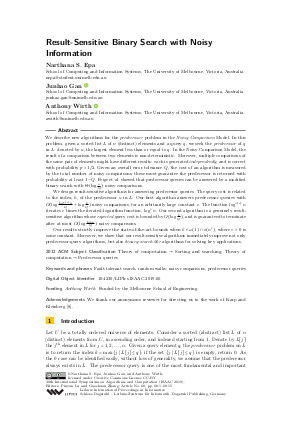Result-Sensitive Binary Search with Noisy Information
Authors
Narthana S. Epa,
Junhao Gan  ,
Anthony Wirth
,
Anthony Wirth 
-
Part of:
Volume:
30th International Symposium on Algorithms and Computation (ISAAC 2019)
Part of: Series: Leibniz International Proceedings in Informatics (LIPIcs)
Part of: Conference: International Symposium on Algorithms and Computation (ISAAC) - License:
 Creative Commons Attribution 3.0 Unported license
Creative Commons Attribution 3.0 Unported license
- Publication Date: 2019-11-28
File

PDF
LIPIcs.ISAAC.2019.60.pdf
- Filesize: 0.78 MB
- 15 pages
Document Identifiers
Subject Classification
ACM Subject Classification
- Theory of computation → Sorting and searching
- Theory of computation → Predecessor queries
Keywords
- Fault-tolerant search
- random walks
- noisy comparisons
- predecessor queries
Metrics
- Access Statistics
-
Total Accesses (updated on a weekly basis)
0Document
0Metadata
Abstract
We describe new algorithms for the predecessor problem in the Noisy Comparison Model. In this problem, given a sorted list L of n (distinct) elements and a query q, we seek the predecessor of q in L: denoted by u, the largest element less than or equal to q. In the Noisy Comparison Model, the result of a comparison between two elements is non-deterministic. Moreover, multiple comparisons of the same pair of elements might have different results: each is generated independently, and is correct with probability p > 1/2. Given an overall error tolerance Q, the cost of an algorithm is measured by the total number of noisy comparisons; these must guarantee the predecessor is returned with probability at least 1 - Q. Feige et al. showed that predecessor queries can be answered by a modified binary search with Theta(log (n/Q)) noisy comparisons.
We design result-sensitive algorithms for answering predecessor queries. The query cost is related to the index, k, of the predecessor u in L. Our first algorithm answers predecessor queries with O(log ((log^{*(c)} n)/Q) + log (k/Q)) noisy comparisons, for an arbitrarily large constant c. The function log^{*(c)} n iterates c times the iterated-logarithm function, log^* n. Our second algorithm is a genuinely result-sensitive algorithm whose expected query cost is bounded by O(log (k/Q)), and is guaranteed to terminate after at most O(log((log n)/Q)) noisy comparisons.
Our results strictly improve the state-of-the-art bounds when k is in omega(1) intersected with o(n^epsilon), where epsilon > 0 is some constant. Moreover, we show that our result-sensitive algorithms immediately improve not only predecessor-query algorithms, but also binary-search-like algorithms for solving key applications.
Cite As Get BibTex
Narthana S. Epa, Junhao Gan, and Anthony Wirth. Result-Sensitive Binary Search with Noisy Information. In 30th International Symposium on Algorithms and Computation (ISAAC 2019). Leibniz International Proceedings in Informatics (LIPIcs), Volume 149, pp. 60:1-60:15, Schloss Dagstuhl – Leibniz-Zentrum für Informatik (2019)
https://doi.org/10.4230/LIPIcs.ISAAC.2019.60
BibTex
@InProceedings{epa_et_al:LIPIcs.ISAAC.2019.60,
author = {Epa, Narthana S. and Gan, Junhao and Wirth, Anthony},
title = {{Result-Sensitive Binary Search with Noisy Information}},
booktitle = {30th International Symposium on Algorithms and Computation (ISAAC 2019)},
pages = {60:1--60:15},
series = {Leibniz International Proceedings in Informatics (LIPIcs)},
ISBN = {978-3-95977-130-6},
ISSN = {1868-8969},
year = {2019},
volume = {149},
editor = {Lu, Pinyan and Zhang, Guochuan},
publisher = {Schloss Dagstuhl -- Leibniz-Zentrum f{\"u}r Informatik},
address = {Dagstuhl, Germany},
URL = {https://drops.dagstuhl.de/entities/document/10.4230/LIPIcs.ISAAC.2019.60},
URN = {urn:nbn:de:0030-drops-115568},
doi = {10.4230/LIPIcs.ISAAC.2019.60},
annote = {Keywords: Fault-tolerant search, random walks, noisy comparisons, predecessor queries}
}
Author Details
- School of Computing and Information Systems, The University of Melbourne, Victoria, Australia
- School of Computing and Information Systems, The University of Melbourne, Victoria, Australia
Funding
- Wirth, Anthony: Funded by the Melbourne School of Engineering.
Acknowledgements
We thank our anonymous reviewer for directing us to the work of Karp and Kleinberg [Karp and Kleinberg, 2007].
References
-
Javed A Aslam and Aditi Dhagat. Searching in the presence of linearly bounded errors. In STOC, pages 486-93, 1991.

-
R. Beigel. Unbounded Searching Algorithms. SIAM Journal on Computing, 19(3):522-537, 1990.

-
Jon Louis Bentley and Andrew Chi-Chih Yao. An almost optimal algorithm for unbounded searching. Information Processing Letters, 5(3):82-7, 1976.

-
Ryan S. Borgstrom and S. Rao Kosaraju. Comparison-based Search in the Presence of Errors. In STOC, pages 130-6, 1993.

-
Xi Chen, Sivakanth Gopi, Jieming Mao, and Jon Schneider. Competitive analysis of the top-K ranking problem. In SODA, pages 1245-64, 2017.

-
Ferdinando Cicalese. Fault-Tolerant Search Algorithms. Springer, 2016.

-
U. Feige, P. Raghavan, D. Peleg, and E. Upfal. Computing with Noisy Information. SIAM Journal on Computing, 23(5):1001-1018, 1994.

-
Richard M. Karp and Robert Kleinberg. Noisy Binary Search and Its Applications. In Proceedings of the Eighteenth Annual ACM-SIAM Symposium on Discrete Algorithms, SODA '07, pages 881-890, Philadelphia, PA, USA, 2007. Society for Industrial and Applied Mathematics.

-
Donald E. Knuth. Supernatural Numbers. In David A. Klarner, editor, The Mathematical Gardner, pages 310-25. Springer US, 1981.

- Stefano Leucci and Chih-Hung Liu. A Nearly Optimal Algorithm for Approximate Minimum Selection with Unreliable Comparisons. arXiv, 2018. URL: http://arxiv.org/abs/1805.02033.
-
Andrzej Pelc. Searching with known error probability. Theoretical Computer Science, 63(2):185-202, 1989.

-
Andrzej Pelc. Searching games with errors—fifty years of coping with liars. Theoretical Computer Science, 270(1):71-109, 2002.

-
J. C. Raoult and J. Vuillemin. Optimal unbounded search strategies. In Jaco de Bakker and Jan van Leeuwen, editors, ICALP, pages 512-530, 1980.

-
B. Ravikumar. A Fault-Tolerant Merge Sorting Algorithm. In Oscar H. Ibarra and Louxin Zhang, editors, Computing and Combinatorics, pages 440-447, 2002.

-
Alfréd Rényi. On a problem of information theory. MTA Mat. Kut. Int. Kozl. B, 6:505-516, 1961.

-
R.L. Rivest, A.R. Meyer, D.J. Kleitman, K. Winklmann, and J. Spencer. Coping with errors in binary search procedures. Journal of Computer and System Sciences, 20(3):396-404, 1980.

-
M. Saks and A. Wigderson. Probabilistic Boolean decision trees and the complexity of evaluating game trees. In FOCS, pages 29-38, 1986.

-
Stanisław M Ulam. Adventures of a Mathematician. Univ of California Press, 1991.

